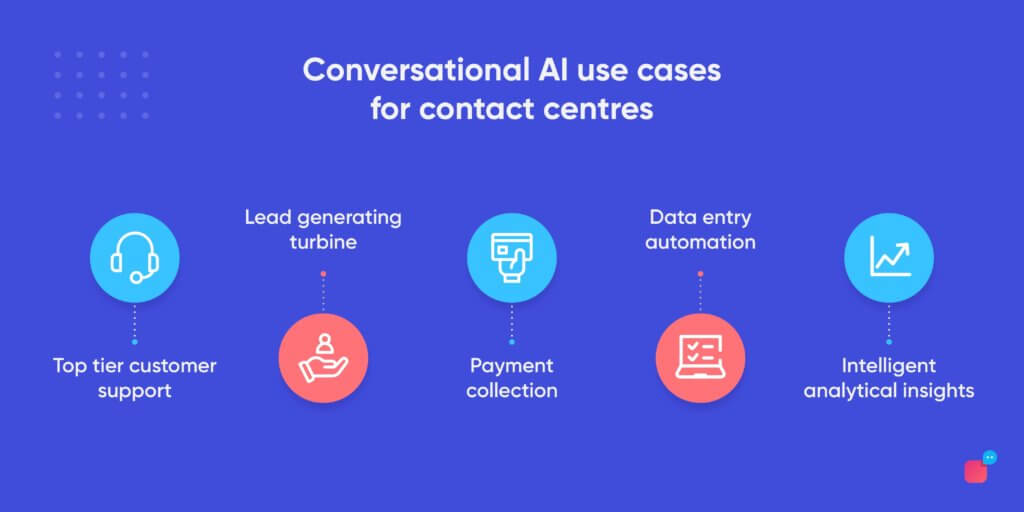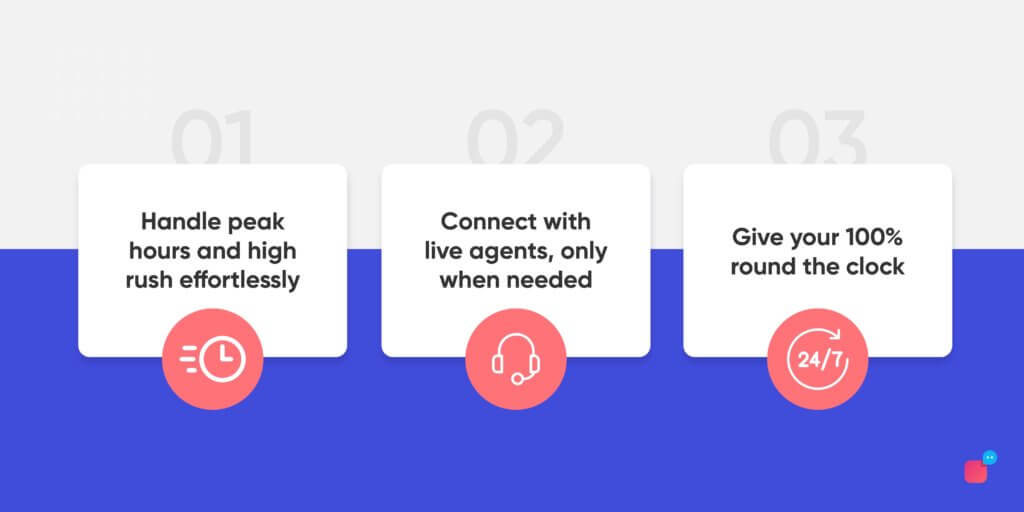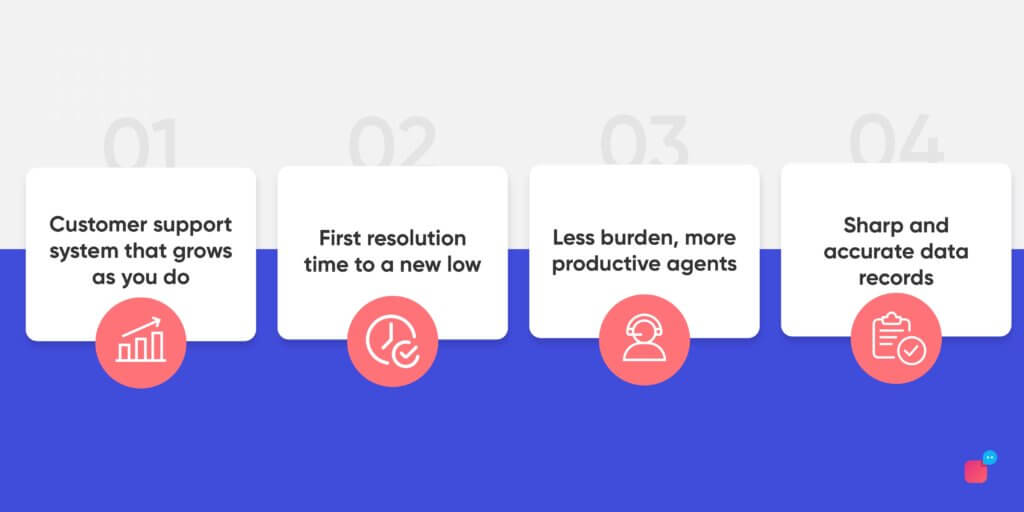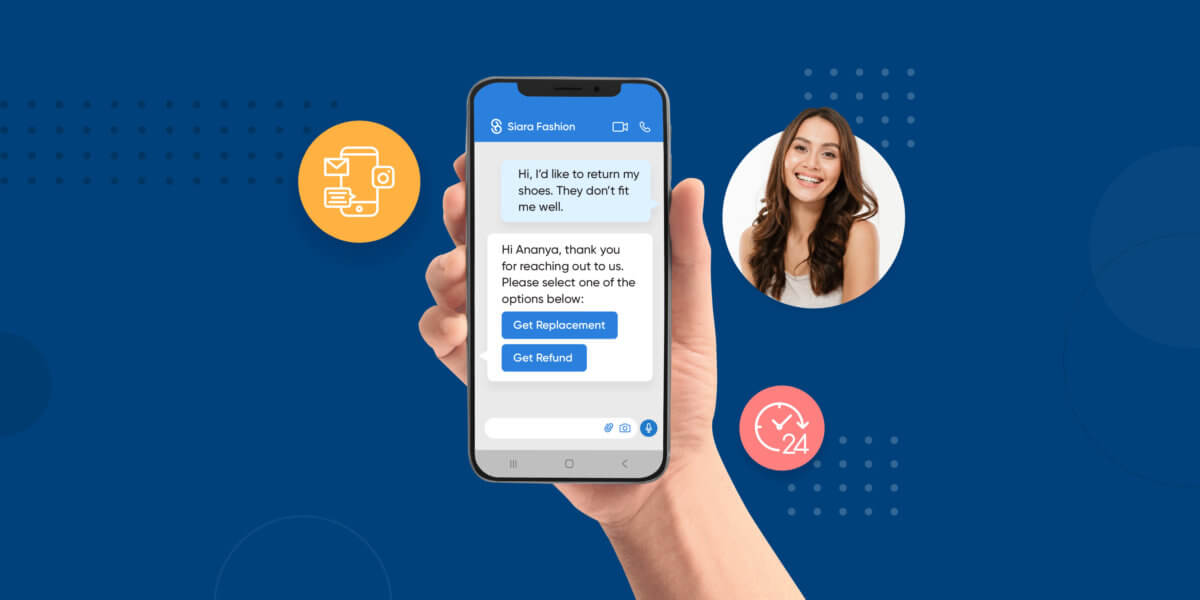Here’s Why Your Customer Support Needs Contact Centre AI

Here’s Why Your Customer Support Needs Contact Centre AI
Conversational AI is here to truly revolutionise contact centres into efficient, accurate, and smooth support engines. Read more to find out!
The COVID-19 outbreak upended the world order and introduced numerous challenges across industries overnight. As HR challenges grew, contact centres were unsurprisingly one of the hardest-hit departments. The massive shift to remote work saw more than 70% of contact centres go virtual. Many consumers today find the resident contact centre tech, such as IVR, unfulfilling, bringing the need for AI in call centre.
Needless to say, the contact centre technology failed to make customers happy. Even as fledgling AI applications gained traction in the 2000s, contact centres used technology to reduce expenses rather than improve customer experience.
Two megatrends turned this attitude on its head.
First, the widespread espousal of smartphones, combined with social media, both reformed and dramatically heightened customer expectations.
Second, growing cloud services and ML tools have put AI capabilities in the reach of contact centres to improve CX. And since they are more aware of the role it plays today, they are increasingly investing in contact centre AI, as per a recent poll.
The path to conversational AI
Contact centres have undergone a gradual transformation over time. Beginning from human-to-human engagements to interactive voice response (IVR) technology, contact centres had taken a big leap. However, this is also where they had stagnated with IVR.
Chatbots were the next frontier in contact centre engagement, and they did a supremely better job. As usage practices evolved, however, people, and enterprises, found that chatbots were best used as a supplementary tool. Since they were limited in their scope and ability to understand human empathy and subsequently reciprocate it.
To not fall into the same trap as they did with IVR and miss out on the opportunity to offer the CX that customers wanted, enterprises focused their efforts on building a tool that would complement agents and conversational AI was born.
Check out: How voice AI is solving these 3 burning contact centre challenges.
Contact centre AI use cases you need to know
Here’s a brief look at a few use cases of chatbot-enabled automation and how it is changing the game in contact centres.

- Conversational AI complements contact centre agents in delivering happier support experiences. It prevents any backlog of tickets and keeps the support engine running smoothly.
- AI-enabled chatbots can proactively engage visitors on website landing pages, explore their willingness to transact with a brand, and collect their information as prospective leads.
- A conversational bot can even assist your contact centre team in collecting payments through customers’ preferred payment methods.
- Contact centre AI can also automate the process of data collection and entry. They can also perform the job with a higher level of accuracy while boosting employee productivity and reducing turnaround times.
- Courtesy of the speech analytics capabilities of chatbots, AI in contact centres can analyse all calls made to them and derive rich insights, such as agent response quality, empathy, and CSAT scores.
Chatbots, voicebots, and the beginning of contact centre AI automation
Chatbots are conversational AI programs that employ ML with NLP algorithms to grasp the ‘intent’ behind human interactions and respond appropriately. This makes them very popular with contact centres, thanks to their ability to service repeat customer queries instantly and handle call routing, all while shortening turnaround times.
In fact, these AI-powered bots are so prevalent that they already handle 85% of all customer interactions.
How do contact centre AI chatbots improve customer support?
Listed below are three ways in which chatbots are transforming contact centres and impacting CX positively.

1. Manage spikes in customer call volumes
Contact centre chatbots can manage spikes in call volumes and diminish operational costs. Organisations can employ a call-diversion approach, driven by AI-powered chatbots, where incoming calls are diverted to chatbots. These bots can offer instant support to customers all the while effortlessly managing call volume surges.
2. Reroute customers to human agents
AI-enabled chatbots can supervise various interactions with customers, and, at crucial moments, reroute the customer to a human agent for additional assistance. Conversational AI is equipped to handle simple and repetitive questions. For anything complex, it reroutes to human agents, depending on the context of the chat such that the user doesn’t have to repeat themselves.
3. Provide round-the-clock support
Unlike live agents, chatbots can be present 24 hours a day. They rarely need downtime, if ever, and can also provide support at scale. What’s more, they can also have specific customer service functions integrated within them and be fielded on holidays too, eliminating staffing concerns.
Contact centre AI and voice assistants
Conversational AI has gradually become mainstream for millions who have espoused such voice assistants as Apple’s Siri and Amazon’s Alexa in their daily lives. In fact, a reported 500 million people use Google Assistant alone as the number of people adopting leading voice assistants continues to grow.
For contact centres, conversational AI is changing the game to offer quicker, more precise, and more scalable services without introducing more agents in the fray or license with a business process outsourcing (BPO) provider.
4 Absolute reasons why contact centres need Voice AI
Here, we will look at five ways in which conversational AI in the form of voice assistants are transforming contact centres.

1. Automated scalability
Voice assistants offer organisations the power to scale their customer service, even with limited resources at their disposal. As they grow and scale, businesses can train their voice AI with more datasets to ensure it can serve numerous customer queries simultaneously, and more importantly, accurately.
2. Improved first contact resolution
Voice assistants can automate level one customer queries almost instantaneously by accurately understanding their context. And so, it results in better first contact resolution as customers don’t have to face lengthy hold times to resolve their queries.
3. Increased agent engagement and productivity
With voice AI, human agents can expedite the call resolution process. Contact centre AI voicebots can automate level-one queries. Thus freeing up more time for human agents to focus on more pressing issues.
4. More accurate data collection
Voice assistants can ask customers the right questions that can help human agents double down on the cause. This also equips them to resolve queries, resulting in a quicker resolution time delivering better customer experience.
Ready to Chat(bot)?
With customer experience as the prevalent competitive battleground, offering customers better service has never been more important. As per Salesforce, 84% of customers find CX to be as important as the company’s products and services. The hybrid ecosystem of chatbots and voice AI enables enterprises to bring innovation to the contact centre while delivering a faster, more meaningful experience to customers. Ace your customer support game with Verloop.io, India’s best conversational AI platform!







